Lee Kirby, Salute Co-Founder and retired Army Colonel, interviewed veteran Fritz Little, a retired US Army Lieutenant Colonel and current Director of Program Delivery at Salute
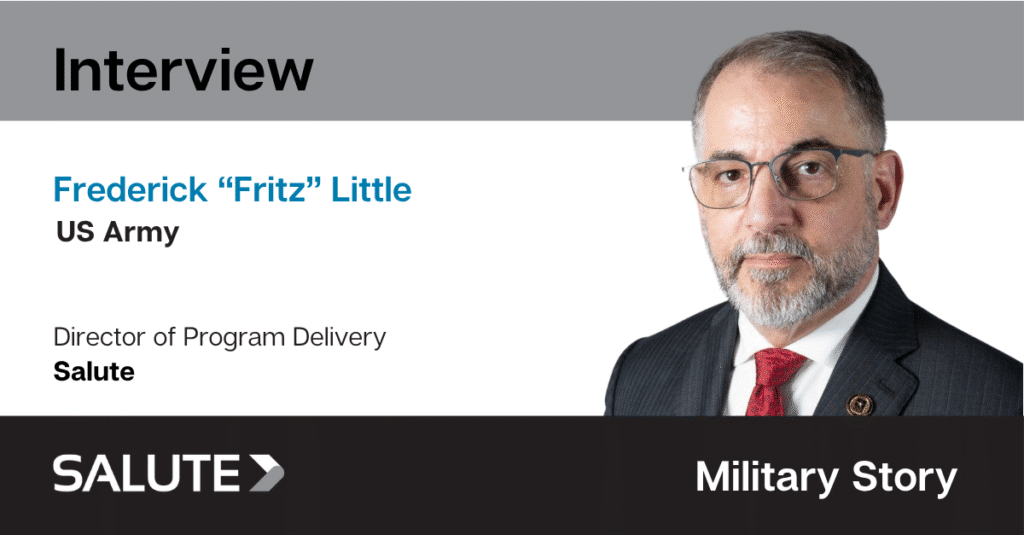
Before we dig in, our readers would love to get to know you a bit. Can you tell us a bit about your childhood “backstory”?
I grew up in a family that valued education—my father was a college professor, and we moved several times before settling near Rochester, New York. As I approached my senior year of high school, I had no clear direction for my future. While college was a family expectation, I felt drawn to something different and began exploring military service. My decision wasn’t well received, except by my father, who supported me. I first contacted the Marines—they did have the best uniforms after all—but they couldn’t guarantee a job or duty station. The Army, however, offered a three-year enlistment with both. At 17, with my father’s signature, I enlisted for what I thought would be three years. Thirty-five years later, I retired from the Army.
What are you doing today?
I am currently the Director of Program Delivery at a large data center campus in Northern Virginia. How I arrived here is a story in itself. After retiring from the Army, I built a rewarding career at USAID, working in humanitarian assistance, disaster response, and readiness until the DOGE cuts earlier this year. At that point, I chose early retirement and began looking for the next chapter in my career. I attended a veteran-focused job fair where iMasons Armed Forces Groups was providing an overview of opportunities in the data center industry.
Initially, I planned to skip the briefing—I had no engineering or electrical background and knew very little about data centers. But given how often data centers are discussed in relation to Northern Virginia, I decided to sit in. I was quickly drawn in, especially when the presenter, a retired Navy submarine commander (Preston Gilmore), mentioned Lee Kirby, and credited him with mentoring his transition into the industry. He explained that he had met Lee at a similar veteran hiring event a few years ago. Curious, I checked LinkedIn to see if this was the same Lee Kirby I had served with 15 years earlier in Iraq—and it was!
After the presentation, I spoke with the presenter, asked more about the industry, and inquired whether there were opportunities for someone without a data center background but with decades of leadership, management, and problem-solving experience. I mentioned my connection to Lee, and he encouraged me to reach out.
I emailed Lee expecting a polite reply in a week or two. Instead, true to who he is, he called me within hours. We had the chance to reconnect, reminisce, and catch up. He offered to share my résumé within the data center community and suggested ways to learn more about the industry and assess whether it was the right fit. The more I learned, the more it resonated with me. As of this past July, I am proud to be part of the data center community and to bring my experience to this role.
Can you tell us a bit about your military background?
I began my military career as a Military Police (MP) private, assigned to the Old Guard at Fort Myer near Arlington Cemetery. Initially, I worked ceremonies and gate duty, then transitioned into investigations after attending MP Investigations School. I was promoted to Sergeant and extended my service for an assignment in Hawaii, where I discovered my passion for the tactical side of the Army. Later, I became a recruiter in Binghamton, NY, and earned an ROTC scholarship through the Green to Gold program. After graduating from Rochester Institute of Technology, I was commissioned as an MP officer and served in airborne units during Operation Just Cause and Desert Storm.
I commanded an MP company in Alaska and served as Provost Marshal at Fort Richardson. I then trained at the JFK Special Warfare Center on Fort Bragg, NC to become a Special Operations Civil Affairs and Psychological Operations Officer, spending the rest of my career in Special Operations. Though trained for Latin America, I deployed to Central Asia and the Middle East, including Tajikistan, Afghanistan, and Iraq. My final deployment was in Iraq as the G9 Civil Military Officer for US Division North. I concluded my career as the Civil Affairs Branch Chief at US Special Operations Command, retiring in 2014.
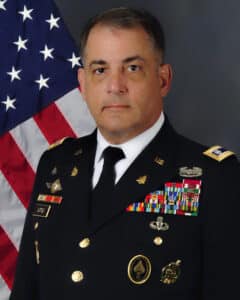
Can you share an interesting experience from your military career? What lesson did you take from it?
When I deployed to Dushanbe, Tajikistan in the fall of 2001, I was tasked to set up a Coalition Humanitarian Laison Cell to help prevent a humanitarian crisis caused be the impending war. The intent was that I would get everything set up and a larger Special Operations team would arrive to relieve me within a week or two. I was alone throughout this time, and my relief didn’t get there for almost six weeks. During that time, I was able to rent a safe house, hire a driver and interpreter and coordinate with representatives from numerous international NGOs who were operating in the area. Looking back, such an assignment would be unthinkable today due to force protection protocols, but the urgency and limited resources of the Special Operations community required adaptability.
When faced with a challenge, focus on the mission rather than ideal conditions. Maintain situational awareness, trust your abilities, and be creative in solving problems.
Did your military experience help prepare you for business and leadership? How?
Yes. One often undervalued aspect of military service is the opportunity to develop critical thinking, planning, and problem-solving skills. This is true for veterans who served one enlistment as well as those who made the military a career. The skills we gain as part of a mission-focused team instill in us the values and discipline required to accomplish objectives together. Those who advance into noncommissioned and commissioned officer ranks continuously receive increasingly higher level ongoing training and experiences that prepare them for the expanding complex challenges that military leaders face every day.
I have found that my military experience directly prepared me for success in operations and leadership roles in the public and private sector. It taught me how to lead diverse teams under pressure, make sound decisions with limited information, and solve complex problems in fast-changing environments. Those experiences developed a level of discipline, accountability, and critical thinking that is often overlooked but highly valuable in business—especially when it comes to aligning teams around a mission, managing risk, and delivering results in challenging circumstances.
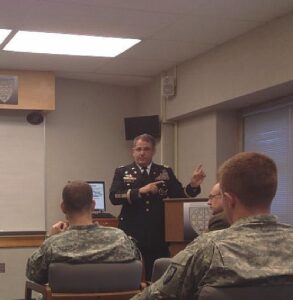
None of us are able to achieve success without some help along the way. Is there a particular person who you are grateful towards who helped get you to where you are? Can you share a story?
My wife has been instrumental to my success. When I deployed after 9/11, we had just learned we were expecting our youngest child. She managed the pregnancy and cared for our six-year-old son largely on her own. I returned briefly for the birth, but redeployed just days later. Her strength and resilience through multiple deployments have been extraordinary. There’s a saying that the hardest job in the Army is being an Army wife—she’s proven it time and again. Our four amazing adult children and much of my own success are a testament to her unwavering support.
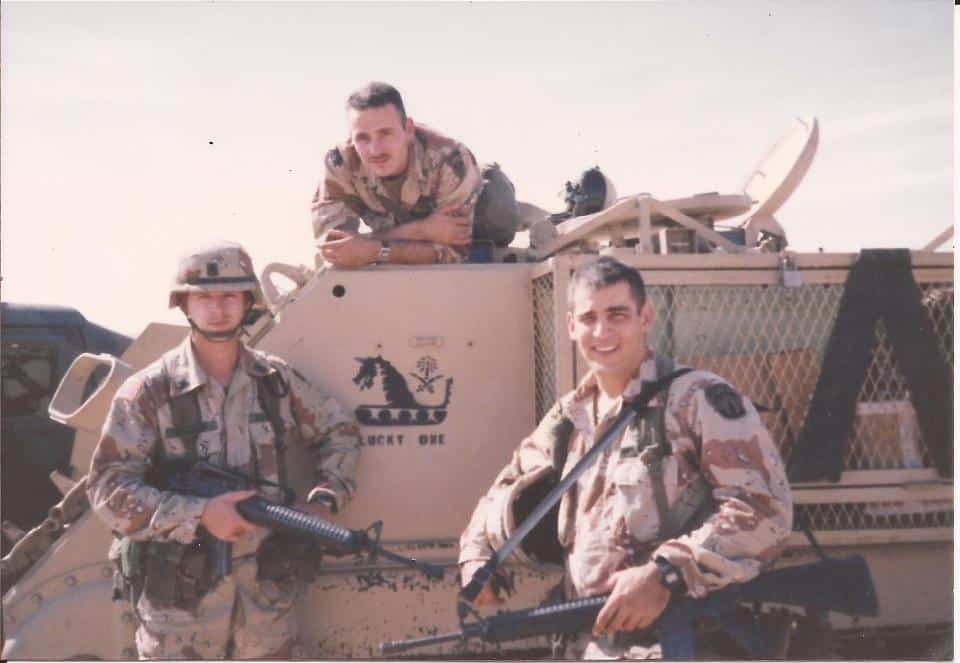
If you could inspire a movement that would bring the most good to the most people, what would it be?
- Career Awareness: Workshops and campaigns to demystify data centers and showcase real-world applications.
- Inclusive Outreach: Promote diverse technical and non-technical roles, especially to underrepresented communities.
- Hands-On Learning: Expand partnerships with schools, colleges, and tech companies to offer internships, virtual labs, and mentorship.
- Inspirational Storytelling: Use social media and video platforms to make the industry relatable and exciting.
- Youth Engagement: Collaborate with organizations like scouting to create a “Data Center Explorer” badge or certification.
Much of this is already happening in pockets across the industry, but a unified approach would enhance credibility and consistency, amplifying its impact
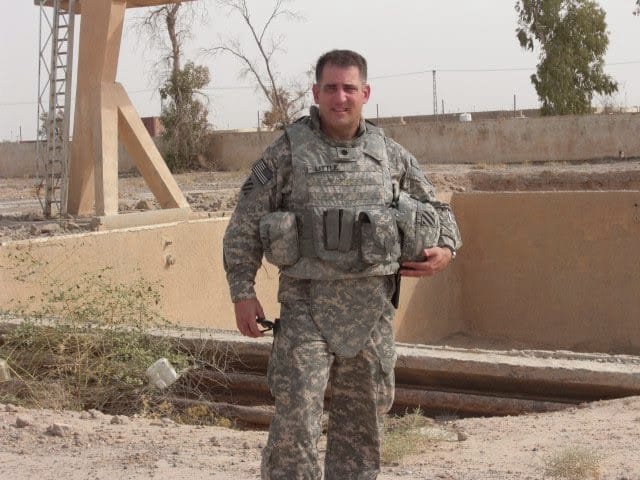
How can our readers follow you online?
I am only on LinkedIn.
We gave up other social media for Lent several years ago, and after realizing how much better our outlook on life was after 40 days without it, we never went back!
